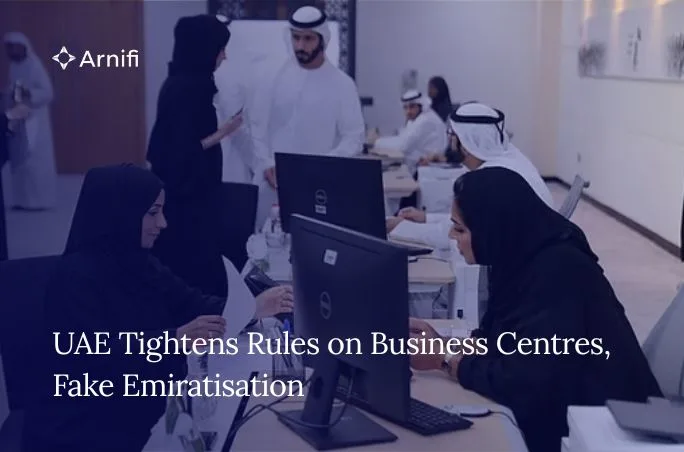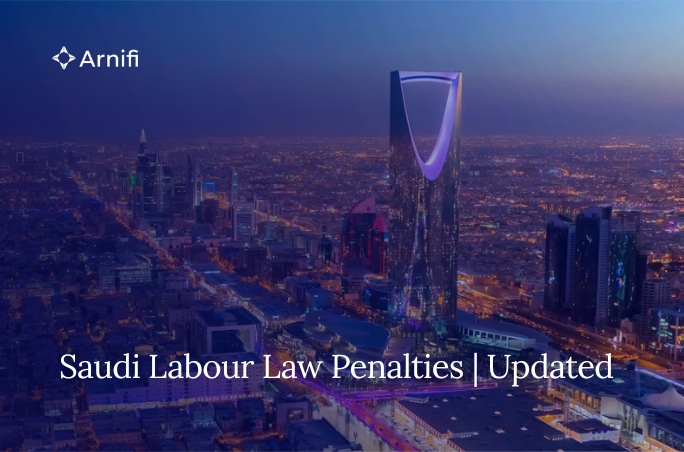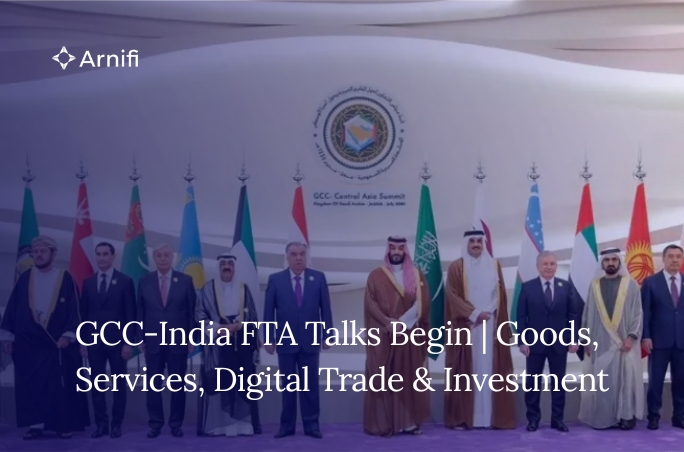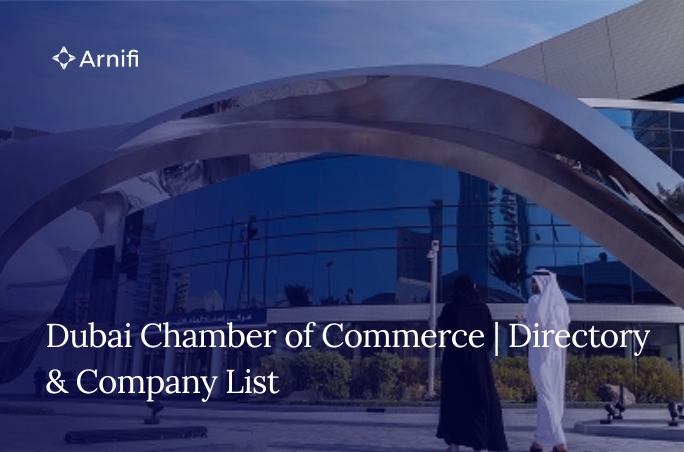UAE Introduces New Oversight Framework for Business Centres; Cracks Down on “Fake Emiratisation” Schemes
by Ishika Bhandari Nov 11, 2025  9 MIN READ
9 MIN READ

Table of contents
With the landmark experts in regulatory updates by the Ministry of Human Resources and Emiratisation (MoHRE) for tighter oversight of business centers that broker labour-market and employment services, Ministerial Resolution No. 702 of 2025 classifies those centers that are other private-sector entities authorized for either providing or facilitating MoHRE services for the other business enterprises or individuals into strict licensing standards, data-security obligations, pre-screening of employees, and new sets of administrative and judicial penalties for non-compliance.
The reform is part of a national agenda by the UAE government to bolster regulation in the labour market while reinforcing service transparency, protecting data privacy, and ensuring that national-initiated labour policies, especially the Emiratisation programme, are fully compliant and not circumvented.
Why the Change Now?
In recent years, the UAE has focused on Emiratisation, increasing UAE citizens’ involvement in the private sector. One of the key aspects was to ensure private-sector companies register Emirati nationals for real engagement instead of for mere nominal registrations.
“Fake Emiratization” registration practices have been defined by MoHRE as UAE nationals whose registration is formalized without having real positions in work or being rehired repeatedly in order to meet quotas or incentives. Based on 405 cases, identified as fake Emiratization in private companies, private companies launched legal action as a result. These counts are from the first half of 2025. From the middle of 2022 until the end of 2024, almost 2000 firms received penalties for having fictitious Emiratization practices.
Now, business centres-the entities authorized by the ministry to empower, authorize, handle data, register employees, and process permits on behalf of clients through an MoHRE system-are identified as other potential openings through which it might be conducted.
Misleading of documents, abuses of system access, and circumvention of regulatory oversight were some other points raised as lightened forms of misleading service. The new resolution, thus, directs not only the behavior of direct employers, but also the gatekeepers and enablers in the service of the labour service.
Key provisions of Resolution 702 of 2025
The new regulatory framework brought in several major elements designed to seal up loopholes and ensure accountability:
1. Pre-screening of centre employees
All centre staff tend to be pre-screened before they can be permitted access to the MoHRE systems. All personnel who help individual or corporate clients to transact at MoHRE services have to be authorized and registered with the centre.
2. Data privacy and systems access controls
Centers at all times have to maintain confidentiality of the customer data, documents, and information with which they are working in contact with MoHRE systems or processing client service requests. Access credentials must not, under any circumstances, be shared or misused.
3. Scope of authorised activities
Business centers may carry out activities within the authorized scope of activities specified in their licenses; otherwise, they would be in breach for engaging in any operation outside such scope, such as processing services for which they have not been licensed.
4. Employment relationship integrity
Violations referred to in the resolution pertain to:
- Operating without creating fair employment relationships for workers whose permits the centre manages
- Hiring or recruiting workers without valid work permits or non-activation of such permits after their issuance
- Permitting centre employees to work in other places without satisfying the required legal conditions
- Providing false information or documents before MOHRE, while engaging in fake Emiratisation
5. Enforcement and penalties
Any centre employee who either misuses a system authorization or enables others to do so will be subjected to disciplinary action and possibly judicial referral. According to MoHRE, these measures show the ministry’s commitment to fair, transparent, and accountable practices in the labour market.
What constitutes “Fake Emiratisation”
MoHRE determines the term pseudo-emiratization as that in which a UAE national works for a specific company, obtains a work permit for himself, but within the real scope of his employment, he has no duties. Sometimes, people are hired over and over again just for the purposes of fulfilling Emiratisation quotas and benefits.
Such schemes undermine an Emiratisation objective-a program that is not simply numbers, but real integration of UAE nationals into skilled jobs, real responsibilities, and ultimately, a strong national human-capital base aligned with national economic development goals.
The Significance of Regulating Business Centres
Business centres provide very important functions in the Emirates’ labour market. They serve in intermediating services of work permit processing, documentation, and system access between companies and individuals on one side and the MOHRE systems on the other. Because of this intermediary function, they may either comply with the rules or make compliance impossible.
By tightening regulations on such centers, the MoHRE intends to:
- Provide an additional level of safety against false documents or misuse of system authorizations
- Improve service quality, transparency, and data protection for clients engaging with these centers
- Ensure that Emiratization goals are upheld by real employment rather than mere paper registrations
- Strengthening accountability both for the centres and the companies that use their services
Implications for Business Centres and the Private Sector
For business centres:
- The review of policies regarding internal recruitment and credential access must occur, followed by necessary amendments if the policies do not satisfy the pre-screening requirements
- The centre must ensure that its staff are duly authorised to access the Ministry of Human Resources and Emiratisation (MoHRE) systems and that access logs can be audited
- The centres should work strictly within the licensed scope and refrain from undertaking activities other than those for which they are authorised
- They are required to ensure that all services delivered in work permits or employment relationships are genuine, transparent, and comply with MoHRE regulations
For private-sector companies:
- Due diligence in assessing service providers must be exercised, ensuring centre partners comply with the new rules
- They should be aware of increasing compliance risks, not in their operations alone, but through intermediaries
- They should revisit their Emiratisation strategies to ensure these are meaningful and defensible and not just nominal
- Internal mechanisms for monitoring and audit concerning the legal status of any third-party service providers handling MoHRE-related tasks ought to be reinforced
Broader Context and Outlook
This regulatory change comes within a key moment of development in the labour market policy of the UAE. The Emiratisation agenda is gaining a new sense of urgency as the country attempts to build a more diversified economy, to enhance productivity and increase Emirati participation in skilled private-sector jobs.
MoHRE has started reiterating the fact that it is not enough for companies to simply register UAE Nationals but must engage them in meaningful occupations, particularly in sectors deemed vital for national development. At the same time, it has acknowledged that only a minority of companies engage in practices that defeat the desired objectives.
The conduct of the ministry’s digital monitoring, field inspection, and enforcement actions, therefore, signifies its willingness to identify and punish violations; during the first half of 2025, 405 fake Emiratisation cases were flagged, with thousands of firms penalised in previous years for fictitious practices with fines ranging between AED 20,000 and AED 100,000 for every incidence.
That new resolution regarding business centres, then, represents a further logical extension of the enforcement framework, moving away from employers to those intermediaries who provide access and documentation.
The sky’s the limit for more monitoring and targeted audits, spanning both corporates and centres. With the deployment of new-age digital tools and artificial intelligence engines for oversight, even higher compliance standards are likely to emerge. While centres that operate transparently and uphold the Emiratisation agenda may enjoy better licensing clearance and reputational standing, violators stand to suffer a great blow with hefty penalties, tarnished identities, and deprivation of government incentives.
What Companies and Centres Should Do Now?
For business centres:
- An internal audit of current client services, licence scope, employee-access workflows, and data-security practices should be conducted
- Hiring policies ought to be revised so that staff accessing MoHRE systems are pre-screened and authorised in accordance with Resolution No. 702
- The centre needs to delineate its scope of licensing, ensuring that no service is offered outside that scope
- Secure systems to handle client data and documents should be put in place, along with audit trails
- Staff training on the implications of fake Emiratisation, misuse of system access, false documentation, and the risks of legal action should be provided
For private-sector companies engaging centres:
- Verify that their business-centre partners are licensed by the MoHRE and compliant with the new resolution
- Make sure their Emiratisation strategies are genuine so that UAE nationals occupy real roles and responsibilities
- There must be compliance clauses in their contracts with centres handling MoHRE services that specify the centre’s obligations under the new resolution
- Monitor the centre’s performance, documentation practices, and transparency in handling permits and registrations
Conclusion
With the issuing of Ministerial Resolution No. 702 of 2025, MoHRE firmly established the principle regarding the integrity of the UAE labor market system, particularly the Emiratisation project that must be governed not just by the employers themselves but also by their intermediaries that provide labor-related services. Business centers are now responsible for the stringent screening of employees, data management, access control, and compliance with their licensed purposes.
This message is clear up to two points for companies in the private sector. First, the commitment to Emiratisation must be sincere and consistent with national objectives; second, intermediaries and business-centres now comply with the entire new framework that could expose them to serious administrative, legal, and reputational consequences.
Ultimately, it further strengthens the UAE’s commitment towards a labor market environment that is transparent and accountable and has concrete Emirati participation, and not just symbolic compliance. How well these new measures are put into place and how they will be responded to by the centers and companies will define the next chapter in the evolving employment landscape of the UAE.
Top UAE Packages

Related Articles
Top UAE Packages



